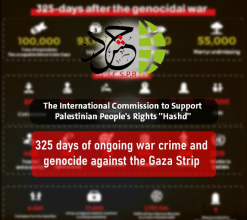
Available international mechanisms to protect the right of the Palestinian people to self-determination in international law
Search titled by:
Available international mechanisms to protect the right of the Palestinian people to self-determination in international law
Analytical study”
By the Researcher
Haitham Mohammed Al-Ghalban
This research was presented as part of a research competition prepared by the International Commission to Support the Rights of the Palestinian People (Hashd).
2022
Abstract
This study dealt with the issue of mechanisms to protect the right of the Palestinian people to self-determination, because of its importance in the absence of the application of these mechanisms in Palestine and the lack of accountability of the Israeli occupation for its crimes committed against the Palestinians, the study touched on the right of the Palestinian people to self-determination in general, and then talked about the international mechanisms that ensured the implementation of the basic rights of the Palestinian people, especially the right to self-determination, which is represented in international charters and agreements such as the Charter of the United Nations and the two international covenants and other laws that guarantee the protection of the Palestinian people rights. The study identified the most important challenges and difficulties facing protection mechanisms and preventing them from performing the tasks assigned to them.
These mechanisms have a special importance stemming from international covenants, breaching their results in an international responsibility that arranges and imposes penalties and compensations on the occupying power as a result of the violations committed against the Palestinian people.
The study concluded with a set of results and recommendations, including:
First: the results
- Mechanisms for protecting the right to self-determination are binding on all Member States under the Charter of the United Nations.
- The veto is not a legal tool and does not work to achieve the principles established by the Charter of the United Nations. Rather, it is the American way to stand by the occupying power in its practices against the Palestinian people.
Second: Recommendations
- The necessity of canceling the decisions issued against the Palestinian people that prevent the Palestinians from enjoying the right to self-determination, especially Partition Resolution No. 181.
- The necessity of amending the Charter of the United Nations, especially Article 108, which allows major powers to control and dominate the Security Council.
Introduction
For more than two centuries international law has sought to reduce the scourge of wars, and armed conflicts and to protect civilians, by placing texts within international conventions and charters to serve as the primary control for the conflicting parties to prevent them from arbitrarily using excessive force and violating the rights of civilians. In addition to creating legal texts within the same agreements or other separate agreements that constitute mechanisms to ensure the application of these texts during the outbreak of armed conflicts, these texts are not vain or mere ink on paper. where the armed parties continued conflicts and violate international conventions, such as the Charter of the United Nations, the four Geneva Conventions, and others without being subjected to any legal accountability before the international community. The Israeli occupation of the State of Palestine and it is carrying out displacement operations since 1948, the policies of apartheid, the continuing crimes, and the deprivation of the Palestinian people of their right to self-determination until this day is considered a vivid example of the flagrant violations of the rules of international law in both its parts, international humanitarian law, and international human rights law. The question that arises here is why the Israeli occupation has not been punished and Palestinian civilians have not been protected from war crimes and crimes against humanity committed against them and the restoration of their stolen rights for more than seventy years, even after the accession of the State of Palestine to the Rome Statute in 2015 and the extension of the mandate of the International Criminal Court to include these crimes, The answer is the absence or weakness of mechanisms that implement the rules of international law, especially mechanisms to protect the rights of peoples to self-determination, which pushes the Israeli occupation to intransigence and continues to commit more crimes and violations against the Palestinian people without complying with international laws in general and the laws that provide for The right of the Palestinian people to self-determination in particular.
Considering the right to self-determination is based on the right of oppressed peoples to self-determination, independence, and freedom from occupation, it is natural that the Palestinian people enjoy their full right to self-determination and the establishment of an independent state following the resolutions of international legitimacy.
Research objectives:
- Analyzing and clarifying the international mechanisms responsible for supervising the implementation of laws protecting the right of self-determination for the Palestinian people.
- Evaluate the mechanisms for implementing international laws related to the right to self-determination in Palestine by examining the extent and the ability of these mechanisms to implement international laws in Palestine and the challenges of implementing them.
- Drafting some proposals that contribute to improving the mechanisms of international protection for the right to self-determination, and ensuring their implementation in Palestine.
Research issue and questions:
The research issue lies in answering the following main question:
What are the international mechanisms for protecting the right of self-determination for the Palestinian people? Are the violations against the Palestinians result in a defect in international agreements and laws or a defect in the application of international mechanisms?
Naturally, several sub-questions will branch from this question:
- What is the right of the Palestinian people to self-determination under international laws, charters, and agreements?
- What are the international legal mechanisms for protecting the right of the Palestinian people to self-determination, the legal framework, and the basic function of each?
- What are the challenges facing the mechanisms of applying international laws in Palestine?
- What is the international responsibility for violations resulting from the flaw in the application of these mechanisms?
Click here to see the full paper





